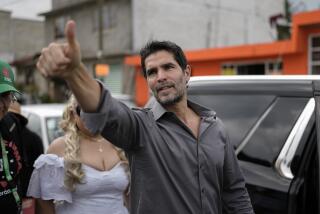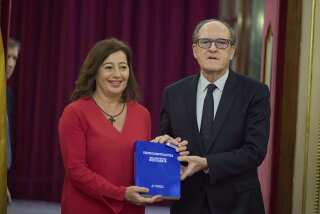Medicine : Condom Program Intensifies Spain’s Church-State Conflict
- Share via
BARCELONA, Spain — Even in the new and permissive Spain, the Socialist government’s unabashed campaign on television and billboards to promote the use of condoms among teen-agers seemed a little startling at first.
The audacity of the $6-million campaign, launched in October, made it inevitable that the Roman Catholic Church would finally confront Prime Minister Felipe Gonzalez and issue the harshest denunciation of his government since it came to power in 1982.
Although focused on condoms, this church-state conflict has many overtones, all reflecting the enormous changes in Spanish religious and sexual mores since the death of dictator Francisco Franco 15 years ago.
The Ministry of Health launched the campaign in the face of troubling numbers: There are more than 60,000 teen-age mothers a year and over 7,000 AIDS victims, with 900 new cases reported every quarter.
The campaign minced neither words nor images. Under the slogan, “Put it on yourself. Put it on him,” the posters displayed a condom and a crossed-out list of problems that its use can help prevent: Unwanted pregnancies, AIDS, gonorrhea, syphilis, hepatitis B and others. TV commercials portrayed teachers praising pupils for owning up to using condoms. The ministry began handing out free condoms to teen-agers.
This kind of open advocacy struck Spanish bishops not only as encouragement of a sinful method of birth control but as incitement to promiscuous sex. In an unusual pronouncement, the bishops condemned the program for “trivializing the sexuality between man and woman. . . . The tone, content and message of the campaign are vulgar and humiliating.”
The bishops insisted that the campaign, by “exciting and inciting” teen-agers into promiscuity and by deluding them into believing that condoms work all the time, would swell the number of unwanted pregnancies, abortions and AIDS victims.
The government dismissed the complaint. Characterizing their statement as “excessively hard,” Rosa Conde, press secretary for the government, said the bishops “demonstrated a large lack of acquaintance with Spanish society.”
The episcopal outcry reflected weakness rather than strength. The church, which supported Franco during the civil war, enjoyed a privileged position as state religion during his years of Fascist rule. Franco enacted church doctrine into law: Divorce was abolished, abortion and the sale of condoms forbidden. Compulsory Catholic religious instruction was imposed in the public schools.
When Franco died in 1975 and the transition to democracy began, the church lost its status as state religion. But it remained a basically conservative force remote from democratic ideas.
Yet, it was far from impotent. The bishops managed enough influence in recent years to force extensive restrictions in a new law allowing abortion.
But the changes in Spanish sexual attitudes may have left the church far behind. Sexual repression was such a hallmark of the Franco era that a Spanish historian called his book about it “Forty Years Without Sex.”
All this was shattered in a cascade of rebellion as democracy took hold. Magazines and movies paraded nudity with child-like glee. Prostitutes advertised in the newspapers. Television started showing soft-core porn films. It became a mark of Spanish democratic pride to refuse to impose any public restriction on sexual liberality.
Many Spaniards are obviously troubled by what sometimes seems like wanton exhibitionism. The church hoped to tap into this disquiet with its attack on the condom campaign.
But no matter what Spaniards feel deep down about the idea of flaunting condoms on TV and billboards, the vast majority, according to the polls, accept the government’s scientific rationale for doing so.
More to Read
Sign up for Essential California
The most important California stories and recommendations in your inbox every morning.
You may occasionally receive promotional content from the Los Angeles Times.













